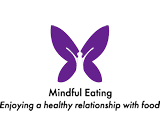How To Develop Mindful Eating Skills
Mindful eating is a way of helping people to relate to and approach food in a more positive way. There are a range of mindful eating skills that are worth developing if you’re trying to eat in a more balanced, healthy way, if you’re trying to improve your overall relationship with food, if you’re trying to lose  weight and want to achieve successful long-term weight management.
weight and want to achieve successful long-term weight management.
Some people feel that food has a lot of control over them, but with mindful eating skills you can be in charge of food rather than feeling that food is in charge of you. We must address our behaviour around food and our relationship with food, rather than blaming food if we overeat or make poor food choices, and developing mindful eating skills is a good place to start, alongside addressing any underlying emotional eating issues.
‘Middle-Way’ Eating
When we have strict rules and boundaries, it can take a lot of energy to maintain those rules- sooner or later our willpower runs out. This is why it can be hard to stick to a diet, mainly because we can feel deprived or feel restricted by rules. Mindful eating is about ‘middle-way’, self-regulated eating, where we learn to feel more satisfied with less food- often, overeating isn’t necessarily enjoyable- our taste buds can ‘tire’ after eating a certain amount of food, to the point where we stop enjoying it- yet we might carry on eating. Mindful eating skills enable us to self-regulate whilst not feeling deprived.
Perfect Eating Doesn’t Exist
Rather than fighting food temptation, labelling foods as ‘good’ or ‘bad’, trying to resist the ‘bad’ foods and then feeling guilty when we don’t, mindful eating is about giving ourselves permission to eat the foods we enjoy in a moderate way, whilst aiming to make food choices in our own best interest, most of the time. Perfect eating doesn’t exist, so it’s about making the best food choices we can in the circumstances we find ourselves, and not beating ourselves up if it doesn’t go according to plan. Food is there to be enjoyed, and it’s also there to nourish us. Most of us find ourselves regularly confronted with food temptations, and mindful eating skills can help us to navigate successfully around the food environment.
Mindless Eating
 The problem arises when we start using food in ways that it becomes self-destructive, mindless overeating, where there’s little enjoyment, just a mechanical process of eating that serves little purpose. The other day a person told me that they just grab food when they see it, and that they don’t seem to have the mechanism to stop themselves. People do have the mechanism to stop themselves from overeating or making unhelpful good choices if they want to; the key to making better food choices is slowing things down, pausing before we go for the food, asking ourselves whether we actually want it or need it in that moment, and then making a careful decision which we’re less likely to regret. Most of us lead hectic lives and we just need to slow down the pace- it’s so easy to make quick food choices with very little thought, operating on ‘autopilot’, often whilst distracted. Mindless eating carried out with little thought can often lead to regret, guilt and shame, fostering a poor relationship with food.
The problem arises when we start using food in ways that it becomes self-destructive, mindless overeating, where there’s little enjoyment, just a mechanical process of eating that serves little purpose. The other day a person told me that they just grab food when they see it, and that they don’t seem to have the mechanism to stop themselves. People do have the mechanism to stop themselves from overeating or making unhelpful good choices if they want to; the key to making better food choices is slowing things down, pausing before we go for the food, asking ourselves whether we actually want it or need it in that moment, and then making a careful decision which we’re less likely to regret. Most of us lead hectic lives and we just need to slow down the pace- it’s so easy to make quick food choices with very little thought, operating on ‘autopilot’, often whilst distracted. Mindless eating carried out with little thought can often lead to regret, guilt and shame, fostering a poor relationship with food.
Building Self-Awareness
Having a range of mindful eating skills in your toolbox can help you to become much more aware of what, how and why you eat. Mindfulness is about paying attention to the detail, non-judgemental observation and awareness, and so self-awareness is a key component of becoming a more mindful eater. Learning mindful eating skills enables us to learn about our own particular eating triggers and to start noticing any unhelpful eating habits. With increased awareness, we can then identify strategies to make positive changes. Mindful eating can also help you to start enjoying less food more, and to eat in a more flexible way based on inner wisdom and personal preferences (not someone else’s diet rules). It can also help you to become more in tune with what food your body needs, not what that inner voice might be telling you to do. By simply paying more attention to your own eating habits you can identify why you might be eating mindlessly and take steps to address it. Awareness is power- it makes positive change possible.
Addressing Excuses To Eat
We intuitively know which foods are best for us in any particular moment but life often gets in the way, as do our emotions, as well as various excuses we might use to overeat or make poor food choices. Our circumstances and frame of mind can get in the way of any healthy intentions; nevertheless, we mustn’t beat ourselves up if we overeat or make an unhelpful food choice, and yet at the same time this shouldn’t give us a licence to eat whatever and as much as we like. Mindful eating includes being aware of excuses you might regularly use to eat, and negotiating with yourself to help you make better food decisions. Examples of common excuses to eat include:-
 “It’s only the one biscuit”
“It’s only the one biscuit”- “I’ve eaten most of the packet so it’s pointless leaving the rest”
- “I can’t let the food on my plate go to waste”
- “There’s no point going to a restaurant if you’re not going to indulge”
- “I don’t have time to cook healthy meals”
- “I blew my diet earlier with a piece of cake, so I may as well eat this now”
- “I deserve this chocolate after the day I’ve had.”
Flexible Eating Is Sustainable
Mindful eating skills can be really useful for anyone who might be overweight or feels out of control of their eating but who doesn’t want to embark on yet another diet. Mindful eating is about flexible eating, which is more sustainable long-term as it’s less restrictive, more realistic and enjoyable. It’s about moderation rather than extreme behaviours such as swinging between restricting food and bingeing. We can really benefit from giving ourselves time to consider our options rather than diving straight into food or operating on ‘autopilot’, where there might be no consideration given to whether to eat, what to eat and how much to eat. Having a dialogue with ourselves such as ‘Am I hungry?’ enables us to put some space between the food and our response to it.
Self-Care
Self-care and self-compassion are also aspects of mindfulness, so when we pay more attention to making better food choices or we don’t beat ourselves up for making poor food choices, we’re actually looking after ourselves. It’s also about self-reliance, being our own cheerleader, not allowing ourselves to give up when things get difficult. A harsh inner critic can make us feel bad or hopeless, which can hinder progress. We have to be patient with ourselves, as positive and sustainable change is a gradual process.
 A Welcome Change From Restrictive Dieting
A Welcome Change From Restrictive Dieting
If you’re ready to start approaching food in a more positive, balanced way, you may well find that as you develop mindful eating skills you will start to feel more empowered and improve your relationship with food. Mindful eating can be a welcome change from restrictive dieting, which can be hard to stick to and provide only short-term results, especially if a person hasn’t addressed their relationship with food. Mindful eating practises can help you to start feeling more at ease with food, and enable you to stop the daily fight with food.
You can read more about my webinars and talks including ‘How To Eat Normally And Lose Weight Without Dieting’.
Click HERE to purchase tickets for any of my events via Eventbrite.
You can read more about my services, including my one-to-one sessions.
If you feel you could benefit from my services, give me a call (Emma Randall) for a FREE chat to discuss: 07961 423120, or email me: info@mindfuleating.org.uk. Sessions via Zoom or face-to-face.

 “It’s only the one biscuit”
“It’s only the one biscuit” A Welcome Change From Restrictive Dieting
A Welcome Change From Restrictive Dieting